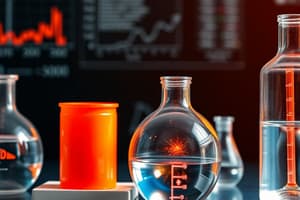Podcast
Questions and Answers
What is the purpose of using techniques to make sense of complex experimental outcomes?
What is the purpose of using techniques to make sense of complex experimental outcomes?
- To confuse researchers
- To make the outcomes more complex
- To distinguish cause from coincidence (correct)
- To prevent others from understanding the outcomes
How do well-supported hypotheses eventually become accepted theories?
How do well-supported hypotheses eventually become accepted theories?
- By not being tested at all
- Based on available evidence (correct)
- By being proven incorrect
- By avoiding new discoveries
Why is it important for researchers to share their findings publicly?
Why is it important for researchers to share their findings publicly?
- To keep the information secret
- To prevent others from verifying the results
- To limit the growth of knowledge
- To allow for reproduction, verification, and application of conclusions (correct)
What should researchers exercise when communicating their results?
What should researchers exercise when communicating their results?
Is the scientific method strictly followed in a linear manner during investigations?
Is the scientific method strictly followed in a linear manner during investigations?
What essential skills can be developed by mastering the core concepts of the scientific method?
What essential skills can be developed by mastering the core concepts of the scientific method?
What is the primary purpose of the scientific method?
What is the primary purpose of the scientific method?
Why is formulating a clear question important in the scientific method?
Why is formulating a clear question important in the scientific method?
What does the phase of 'Gathering Evidence' in the scientific method involve?
What does the phase of 'Gathering Evidence' in the scientific method involve?
Why is analyzing data an essential step in the scientific method?
Why is analyzing data an essential step in the scientific method?
Which of the following best describes the scientific method's approach to drawing conclusions?
Which of the following best describes the scientific method's approach to drawing conclusions?
How do scientists ensure reliable results when gathering evidence in the scientific method?
How do scientists ensure reliable results when gathering evidence in the scientific method?
Study Notes
Science Class 10th: Exploring the Scientific Method
In your science education journey during grade 10, you'll delve into the foundational principles of science through the study of the scientific method. This systematic process helps us ask questions, gather evidence, analyze data, draw conclusions, and communicate our findings effectively.
Here is what you can expect when learning about the scientific method in class 10:
Formulating Questions
The first stage involves identifying a question, problem, or hypothesis worth exploring using empirical means. For instance, why do leaves change color? How does sunlight affect plant growth? Asking the right type of question lays the groundwork for conducting experiments with precision and purpose.
Gathering Evidence
This phase includes collecting data through observation, experimentation, or measurements. To ensure reliable results, scientists typically perform controlled tests while minimizing variables unrelated to their focus. In our earlier example, this might involve comparing photosynthesis rates between plants exposed to different light intensities or analyzing chlorophyll levels under various conditions.
Analyzing Data
Once information has been gathered, it must be interpreted and analyzed thoroughly before drawing any conclusions. Techniques like graphing trends, calculating averages, or performing statistical analyses help reveal patterns within the data. Using these techniques will allow you to make sense of complex experimental outcomes and distinguish cause from coincidence.
Reaching Conclusions
After analyzing data, well-supported hypotheses may become accepted theories based on available evidence. However, even if initial predictions are proven incorrect, insights gained from testing them often lead to new discoveries or better explanations for existing phenomena.
Communicating Results
To complete the cycle, researchers share their findings publicly via presentations, publications, or discussions — allowing others to reproduce similar studies, verify their results, or apply their conclusions elsewhere. When sharing findings, exercise clarity, accuracy, and honesty; avoid misleading statements and always state limitations or areas needing further investigation.
The scientific method isn’t rigidly followed step by step every time scientists conduct investigations. Instead, think of it as a flexible framework they adapt according to the circumstances. By mastering its core concepts, you develop essential skills such as critical thinking, logical reasoning, and effective communication — all fundamental aspects of being a successful scientist!
Studying That Suits You
Use AI to generate personalized quizzes and flashcards to suit your learning preferences.
Description
Test your knowledge on the scientific method, a systematic process used in science to ask questions, collect evidence, analyze data, draw conclusions, and communicate findings. Topics include formulating questions, gathering evidence, analyzing data, reaching conclusions, and communicating results.




